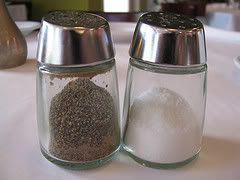 The Food and Drug Administration has received a call to start a study concerning whether it should regulate or limit the amount of sodium that food items contain. A study would take time, and cost more than a couple no fax payday loans no credit check, but advisory groups including the American Medical Association believe it is necessary. Sodium is implicated as being far too present in the American diet. Sodium is known to raise blood pressure, which can lead to heart disease, the number one killer in the US.
The Food and Drug Administration has received a call to start a study concerning whether it should regulate or limit the amount of sodium that food items contain. A study would take time, and cost more than a couple no fax payday loans no credit check, but advisory groups including the American Medical Association believe it is necessary. Sodium is implicated as being far too present in the American diet. Sodium is known to raise blood pressure, which can lead to heart disease, the number one killer in the US.
FDA Sodium study could take awhile
FDA trials can take a long time. The proper amounts of sodium are essential, but more than that is harmful. The Institute of Medicine, part of the National Academy of Sciences, is leading the call for FDA regulation of sodium levels in food. Americans, according to an Institute of Medicine Study, take in far too much sodium in their diets. The study was initiated by Congressional request in 2008.
Sodium is vital in proper proportion
As per this Health Canada page, sodium is vital in regulating and balance of bodily fluids. High blood pressure can be brought on by too much sodium, along with hypertension and heart disease, which is the largest killer of U.S. adults. According to the IOM brief, the primary source of sodium within the American diet is through added salt.
Key ingredient in foods not exactly Weight Watchers approved
Many high fat foods, such as french fries, pizza and a lot of preserved and processed foods, a maligned mainstay of the American diet, use more salt than the IOM or American Medical Association would like. In USA Today, the American Medical Association asserted that if the FDA were to reduce the amount of sodium restaurants and food producers put in their foods, 150,000 lives could possibly be saved over the next 10 years. The IOM states that the average intake is over 3400 milligrams, though the recommended maximum is 1500 mg.
Heart disease is the number one killer in the US
More Americans die due to heart disease than anything else. Our diet is considered the prime culprit. Higher blood pressure is known to be caused by too much sodium intake, and a heart transplant is a lot more than cash advances can cover, even with the best insurance. If there is merit, this might be worth pursuing.
Article Sources
http://www.iom.edu/Reports/2010/Strategies-to-Reduce-Sodium-Intake-in-the-United-States/Report-Brief-Strategies-to-Reduce-Sodium-Intake-in-the-United-States.aspx
http://www.hc-sc.gc.ca/hl-vs/iyh-vsv/food-aliment/sodium-eng.php
http://www.usatoday.com/news/health/2010-04-20-fda-salt-cutback_N.htm
No comments:
Post a Comment